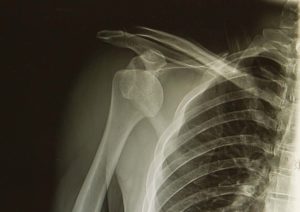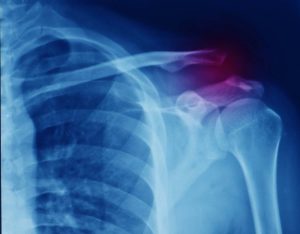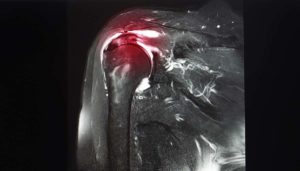
Frozen Shoulder
Typical Symptoms
A frozen shoulder, as the name implies, is where your shoulder movement is limited in all directions. It usually follows a characteristic pattern of freezing (with pain and progressive loss of movement), followed by the frozen phase (with significantly reduced movement) and then later thawing (as pain settles and movement improves).
There can also be radiation (spreading) of and electric pain along the length of the arm, night pain affecting sleep and tingling in the hands.

What causes it?
A frozen shoulder is due to progressive tightness and stiffness of the joint. It can arise from a trauma to the shoulder or can be associated with conditions such as diabetes or thyroid disease.
On average, symptoms last 18-24 months if no active treatment is provided and even then, limitations may not return fully to pre-frozen shoulder levels.
How can I help myself?
It is helpful to consider why this developed. If you suspect you have any other underlying contributing condition, then it is helpful to get this looked into. It is important to try and keep the shoulder mobile, if possible, with movement within the limits of pain.
Stretching is also helpful, but again, try not to trigger off your pain symptoms. If pain, however, is the overriding factor, taking regular analgesia can help and adding in treatments such as acupuncture or cupping can improve muscle tightness.
When to seek help?
If the pain is ongoing and there is a progressive reduction in your movement, if it is causing considerable night time disturbance or your function is significantly hampered, it would be a positive step to have this assessed.
What are the treatment options?
Your clinician will assess you with a thorough history and clinical examination to identify where the pain is originating from. An X-ray may help identify whether the limited movement is due to degenerative (wear and tear) changes in the shoulder joint and an ultrasound can be undertaken to look for tendon injuries that could limit movement. An MRI is not usually needed to diagnose a frozen shoulder, however, it can be helpful in diagnosing other injuries within the joint itself.
Treatment usually includes improving movement and strength with a physiotherapist, acupuncture for muscle tightness and pain, and some clinicians may be able to offer you an ultrasound-guided hydrodilatation of the shoulder to try and break up some of the joint tightness. However, if your symptoms persist, a surgical intervention with a capsular release may be required.




